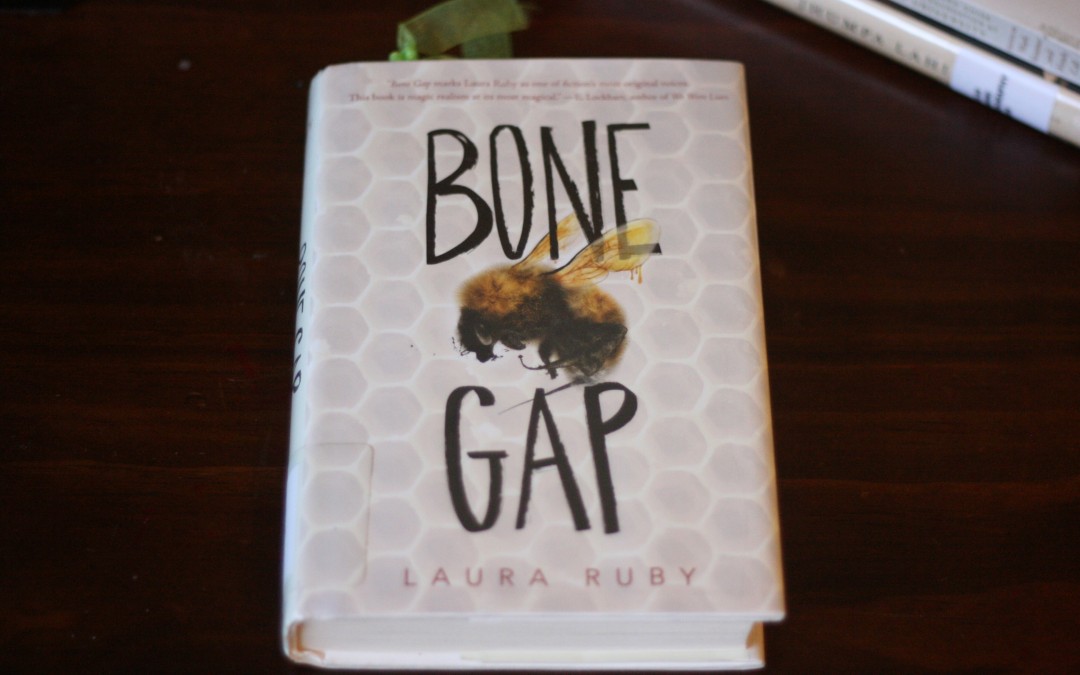I read Bone Gap, by Laura Ruby, several months ago, but, for some reason, I wasn’t quite ready to talk about it. I think it’s because this book takes a lot of digesting. It’s got so many layers that you need some time with it once you finish it.
Bone Gap is the story of Roza, a girl who is mysteriously taken by an unidentified man. Finn, the only one who saw her disappear, can’t get over the guilt of not being able to identify the man who took her. What makes it worse is that his older brother, who is basically his guardian, was in love with Roza.
As you can see, from this short description alone, Bone Gap was full of everything that makes a book worth reading—romance, tension, horror, and even a bit of science fiction. I think what I probably loved most about it is that while it had a small-town feel about it, which reminded me of my own teenage years growing up across the street from cornfields (they play a large part in the book), it also felt large and important. The emotion of it was raw and heartbreaking and tender.
There’s a lot of young adult fiction out there that is surface-level fiction, but Ruby wove a story that was much deeper than the surface. A narrative actually happened beneath the surface, in a whole other realm. In spite of the outward plot, it was a story about two brothers trying to find their way through the wreckage of a mother leaving them. It was about a girl coming to terms with the fact that she was beautiful. It was about another girl circling around to the final belief that being beautiful was okay.
There is so much to say about this story, but I feel like I’d be gushing. Let me just share a quote with you from Ruby’s poetic prose. This is her opening, probably one of the best young adult openings I’ve ever read.
“The people of Bone Gap called Finn a lot of things, but none of them was his name. When he was little, they called him Spaceman. Sidetrack. Moonfaced. You. As he got older, they called him Pretty Boy. Loner. Brother. Dude.
“But whatever they called him, they called him fondly. Despite his odd expressions, his strange distraction, and that annoying way he had of creeping up on a person, they knew him as well as they knew anyone. As well as they knew themselves. They knew him like they knew that Old Charlie Valentine preferred his chickens to his great-grandchildren, and sometimes let them roost in the house. (The chickens, not the children.) The way they knew that the Cordero family had a ghost that liked to rifle through the fridge at night. The way they knew that Priscilla Willis, the beekeeper’s homely daughter, had a sting worse than any bee. The way they knew that Bone Gap had gaps just wide enough for people to slip through, or slip away, leaving only their stories behind.”
I only just finished Six of Crows, by Leigh Bardugo. This is an amazing book. It’s the story of six renegades in the city of Ketterdam who attempt a heist unlike anything their world has ever seen.
It took me a while to get into the book, because it’s a fantasy world that is really intricate. There were lots of new characters with strange names and lots of terms that took a while to get accustomed to. But once I got further into it I could not put Six of Crows down. It had the feel of a teenage Oceans 11, set in a fictional world. I didn’t expect to love it, but I did. And now I can’t stop thinking about it.
What I liked most about Six of Crows is that it was so incredibly complete. When you walked into the fantasy world, there were no questions left unanswered. Bardugo wove the world right around me. I could see it all. I could smell it. I could hear it. It was an imaginary world with impossible things, but it felt real. That’s when you know you’ve found a great fantasy writer.
I also enjoyed that the romance in this book was understated. I’ve read a lot of dystopian young adult science fiction and epic fantasy books, and a whole lot of them do romance wrong—at least wrong in my opinion. They’re full of exhaling breaths and falling into arms that are muscled and strong, and feeling a warm rush in the pit of their stomach as love blooms inside. Bardugo, though, expertly hinted at the romance between characters and showed it more through looks and experiences rather than warm gushy feelings in the pits of stomachs. I found myself aching for characters who hadn’t explicitly shown they were longing for one of the other characters. It was refreshing.
The only thing I might have done differently to this book was cut the prologue. I actually didn’t even remember the prologue until my husband started reading the book and said, “That first chapter was interesting.” I racked my brain to figure out what the first chapter was. Those characters didn’t come back into play again, so it seems like the story could have done without it.
If I were going to describe Six of Crows with one word, it would be smart. The story was impressively smart. The fight scenes, the characters, the actual heist itself—it was all smart. Thrilling, even. Bardugo’s sequel, Crooked Kingdom, released Sept. 27, and I can’t wait to start reading.
I hope you enjoyed these book recommendations. Be sure to pick up a free book from my starter library and visit my recommends page to see some of my favorite books. If you have any books you recently read that you think I’d enjoy, contact me. I always enjoy adding to my list. Even if I never get through it all.


